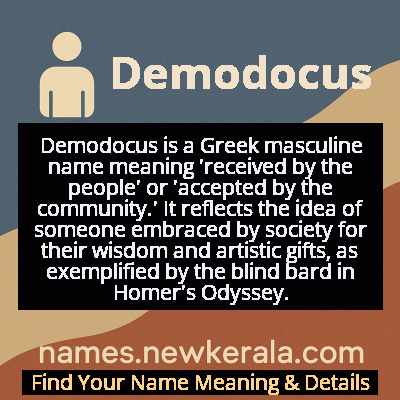Demodocus Name Meaning & Details
Origin, Popularity, Numerology Analysis & Name Meaning of Demodocus
Discover the origin, meaning, and cultural significance of the name DEMODOCUS. Delve into its historical roots and explore the lasting impact it has had on communities and traditions.
Name
Demodocus
Gender
Male
Origin
Greek
Lucky Number
9
Meaning of the Name - Demodocus
Demodocus is a Greek masculine name meaning 'received by the people' or 'accepted by the community.' It reflects the idea of someone embraced by society for their wisdom and artistic gifts, as exemplified by the blind bard in Homer's Odyssey.
Demodocus - Complete Numerology Analysis
Your Numerology Number
Based on Pythagorean Numerology System
Ruling Planet
Mars
Positive Nature
Generous, passionate, energetic, and humanitarian.
Negative Traits
Impulsive, impatient, moody, and can be overly emotional.
Lucky Colours
Red, maroon, scarlet.
Lucky Days
Tuesday.
Lucky Stones
Red coral, garnet.
Harmony Numbers
1, 2, 3, 6.
Best Suited Professions
Military, sports, philanthropy, leadership roles.
What People Like About You
Courage, energy, leadership, generosity.
Famous People Named Demodocus
Demodocus of Leros
Ancient Greek Poet
Credited with elegiac poetry and gnomic verses, some fragments preserved in ancient anthologies
Demodocus (Homeric Bard)
Mythical Bard
Blind poet in Homer's Odyssey who performed at the court of King Alcinous, singing about Troy and the love affair of Ares and Aphrodite
Demodocus of Corinth
Ancient Athlete
Victorious runner in the Olympic Games, mentioned in Pindar's odes
Name Variations & International Equivalents
Click on blue names to explore their detailed meanings. Gray names with will be available soon.
Cultural & Historical Significance
His performances at the Phaeacian court—particularly his songs about the Trojan War and the gods—highlight the Greek belief in poetry as a medium of truth and cultural preservation. The character embodies the Greek ideal that true vision comes not from physical sight but from inner wisdom and divine favor, making him a symbolic figure for the power of memory and oral tradition in preserving cultural identity across generations.
Extended Personality Analysis
Individuals named Demodocus are typically perceived as possessing deep wisdom, artistic sensitivity, and remarkable memory. They often demonstrate the ability to perceive truths that others miss, much like the mythical bard's blindness paradoxically granted him clearer insight into human nature and divine affairs. These personalities tend to be contemplative, observant, and gifted with storytelling abilities, using narrative and art to connect people and preserve important cultural knowledge.
Their strength lies in intellectual and creative pursuits rather than physical prowess, often showing resilience in overcoming personal limitations. They typically exhibit patience, perceptiveness, and a philosophical approach to life's challenges, making them natural counselors and teachers who guide others through wisdom rather than force. The name suggests someone who values tradition and knowledge, serving as a bridge between past and present through their understanding of cultural heritage.
Modern Usage & Popularity
In contemporary times, Demodocus remains an exceptionally rare name, primarily used by classical scholars, mythology enthusiasts, and parents seeking unique names with deep cultural roots. Its usage is almost exclusively confined to academic circles or families with strong connections to classical studies. The name has never appeared in modern baby name popularity charts and maintains an archaic, scholarly character. Recent interest in mythological names has brought some renewed attention to Demodocus, though it remains far less common than other Greek mythological names like Orion or Athena. Its association with blindness and ancient poetry makes it a niche choice that conveys intellectual depth and cultural sophistication rather than mainstream appeal.
Symbolic & Spiritual Meanings
Demodocus symbolizes the triumph of inner vision over physical sight, representing the idea that true understanding comes from wisdom and memory rather than mere observation. The name embodies the power of oral tradition and cultural memory, serving as a metaphor for the preservation of history and values through storytelling. It also represents resilience in adversity, as the mythical Demodocus turned his physical limitation into a source of artistic strength. The name carries connotations of divine inspiration, suggesting that true artistry comes from connection to higher wisdom rather than mere technical skill, and symbolizes the artist's role as society's memory-keeper and moral compass.

